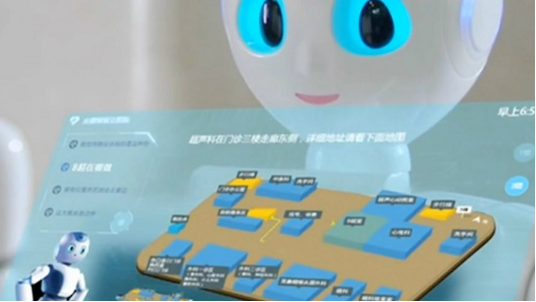By Tom McGregor, CCTV.com Panview commentator and editor
China faces an acute shortage of doctors. Even in China’s first-tier cities - Beijing, Shanghai, Chongqing, Shenzhen and Tianjin - many Chinese must wait in long lines at hospitals and clinics to receive examinations, diagnosis and treatment.
The World Health Organization issued a report in 2016 disclosing that in China, there’s a ratio: 1.5 doctors for every 1,000 people, while in the United States, it’s 2.4 per 1,000 and in the United Kingdom, 2.8 per 1,000.
China may likely witness a further scarcity of doctors in the years ahead along with a rapidly-aging population. Apparently, new solutions are required to help Chinese doctors reduce workloads.
Hence, Chinese developers of Artificial Intelligence (AI) may have found the answer.
AI "assistant doctors" on-duty
In August 2017, scientists at the National Supercomputing Center (NSC) in Changsha, Hunan Province hosted a seminar at Hengyang, City.
They introduced China-made AI-based software that allow deep learning machines to diagnose diseases.

(Photo from CGTN)
The software diagnostic models have passed clinical testing and its diagnostic models can pinpoint over 30 diseases, including Tuberculosis and depression, which are often misdiagnosed.
The People's Daily reports that AI assistant doctors have a 20 percent higher accuracy rate than human doctors.
"It is designed to be a general practitioner," said Peng Shaoliang, deputy director of NSC. "Every one or two weeks, it can learn to diagnose a new disease."
The self-learning AI assistant doctor taps into a huge database of medical knowledge, as well as tens of millions of clinical cases to achieve results.
Assistants, not replacements
"The AI (assistant) doctor will assist human doctors rather than replace them," Kang Xixiong, director of clinical laboratory diagnostics at Capital Medical University, told People's Daily.
Kang added, "For China's medical institutions especially those in poor areas, AI would be a good assistant."
Chinese companies - Baidu, Tencent and Alibaba Group - are key players of AI development in the healthcare field. The Chinese government and academia are also participating.
China's first AI-assisted treatment center has opened in Hefei, Anhui Province on August 2017. Scientists are conducting research to guide machine-learning on recognizing images and using visual neural networks.
According to CGTN, the center features: voice-based information system, computer-aided medical image diagnosis system and other state-of-the-art devices.
The center is expected to serve as the nation's hub for AI assistant doctor development.
Success story in the making
The Hefei-based AI laboratory has access to Big Data from Chinese hospitals and over two million electronic patient files, which can be utilized to improve detection rates of diseases.
The machine-learning device can make a diagnosis on challenging cases. In some instances, doctors in the radiology department have to review multiple medical images to determine a specific diagnosis.
Sometimes, it could take half an hour with a group of doctors to do so, but an AI assistant doctor can achieve the same results in a matter of seconds.
Accordingly, an AI assistant doctor can simplify the treatment process by uploading imaging data, making prescriptions, and developing new applications with hi-tech upgrades.
Meanwhile, patients and doctors can upload AI healthcare APPs on their smartphones for win-win solutions, which will be most helpful for people living in rural regions.
Getting an APP cure
The APP for healthcare will become more appealing as AI assistant doctors play prominent roles. In China, the leading innovator appears to be Baidu, which launched its "Baidu Doctor", an APP for medical application in 2015.
In 2016, Baidu unveiled an AI chatbot, called Melody, to connect with patients to field medical questions and suggest diagnoses for doctors. Melody was developed with advanced deep learning and natural language processing (NLP) technologies integrated into an AI brain.
"I'm seeing just the beginning of what will be a major trend of AI systems in healthcare," Andrew Ng, chief scientist at the Baidu AI research lab in Silicon Valley, told CNBC. "This is resonating well with physicians around the world."
Baidu can tap into Big Data from medical textbooks, Websites and hospitals. Melody can engage in a conversation with the patient to ask follow up questions to inquire about symptoms before making a diagnosis.
More progress to follow-up
We really are just entering the early stages of AI-assisted healthcare. More amazing upgrades on APPs can lead to a total transformation of the medical field.
Hospitals and clinics will enjoy the benefits, since doctors and nurses can utilize AI bots to handle a larger portion of their workloads, so they can focus on hands-on treatment.
Patients can rest assured that even if they live in an isolated location, they can click on the APP and chat with an AI assistant doctor.
Patients suffering from minor ailments can receive treatment advice and recover at-home without having to visit a human doctor.
So going to a doctor near you, will soon have a whole new meaning in our new AI Age.







